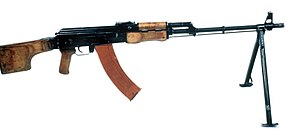RPK
| RPK | |
|---|---|

RPK with bipod and 75-round drum magazine
|
|
| Type |
Light machine gun Squad automatic weapon |
| Place of origin | Soviet Union |
| Service history | |
| In service | 1961–present |
| Used by | See Users |
| Wars | |
| Production history | |
| Designer | Mikhail Kalashnikov |
| Designed | 1961 |
| Manufacturer | Vyatskie Polyany Machine-Building Plant |
| Produced | RPK: 1961–1978 RPK-74: 1974–present |
| Variants | RPKN, RPKS, RPKSN, RPK-74, RPK-74N, RPKS-74, RPKS-74N |
| Specifications | |
| Weight | RPK: 4.8 kg (10.6 lb) RPKS: 5.1 kg (11 lb) RPK-74: 4.7 kg (10 lb) RPKS-74: 4.85 kg (10.7 lb) |
| Length | RPK, RPKS: 1,040 mm (40.9 in) RPKS: 820 mm (32.3 in) stock folded RPK-74, RPKS-74: 1,060 mm (41.7 in) RPKS-74: 845 mm (33.3 in) stock folded |
| Barrel length | 590 mm (23.2 in) |
|
|
|
| Cartridge | RPK, RPKS: 7.62×39mm M43 RPK-74, RPKS-74: 5.45×39mm M74 |
| Action | Gas operated, rotating bolt; closed bolt |
| Rate of fire | 600 rounds/min (RPK), 650 rounds/min (RPK-74) |
| Muzzle velocity | RPK, RPKS: 745 m/s (2,444 ft/s) RPK-74, RPKS-74: 960 m/s (3,149.6 ft/s) |
| Effective firing range | 100–1.000 m sight adjustments |
| Maximum firing range | 3,150 m (3,440 yd) (RPK-74) |
| Feed system | RPK, RPKS: 20, 30, or 40-round curved magazine, 75-round drum magazine RPK-74, RPKS-74: 30 or 45-round box magazine, 100-round plastic drum magazine, belt ammunition (with side mounted belt feed device) |
| Sights | Front: semi-shrouded front post, rear: sliding tangent with adjustable notch Sight radius: 555 mm (21.9 in) |
| RPK-74 | |
|---|---|
 |
|
| Type | Light machine gun |
| Place of origin | Soviet Union |
| Service history | |
| In service | 1974–present |
| Used by | See Users |
| Wars | |
| Production history | |
| Designed | 1974 |
| Produced | 1974–present |
| Specifications | |
| Weight | RPK-74: 4.7 kg (10 lb) RPKS-74: 4.85 kg (10.7 lb) |
| Length | RPK-74, RPKS-74: 1,060 mm (41.7 in) RPKS-74: 845 mm (33.3 in) stock folded |
| Barrel length | 590 mm (23.2 in) |
|
|
|
| Cartridge | 5.45×39mm |
| Action | Gas operated, rotating bolt; closed bolt |
| Rate of fire | 650 rounds/min |
| Muzzle velocity | RPK-74, RPKS-74: 960 m/s (3,149.6 ft/s) |
| Effective firing range | 100–1.000 m sight adjustments |
| Maximum firing range | 3,150 m (3,440 yd) |
| Feed system | RPK-74, RPKS-74: 30 or 45-round box magazine, 100-round plastic drum magazine, belt ammunition (with side mounted belt feed device) |
| Sights | Front: semi-shrouded front post, rear: sliding tangent with adjustable notch Sight radius: 555 mm (21.9 in) |
The RPK (Ruchnoy Pulemyot Kalashnikova, Russian: Ручной пулемёт Калашникова or "Kalashnikov hand-held machine gun") is a 7.62×39mm light machine gun of Soviet design, developed by Mikhail Kalashnikov in the late 1950s, parallel with the AKM assault rifle. It was created as part of a program designed to standardize the small arms inventory of the Red Army, where it replaced the 7.62×39mm RPD light machine gun. The RPK continues to be used by the armed forces of countries of the former Soviet Union and certain African and Asian nations. The RPK was also manufactured in Bulgaria and Romania.
The RPK functions identically to the AK-47. It also uses the same 7.62×39mm ammunition. It has a similar design layout to the AKM and AK-47 series of rifles, with modifications to increase the RPK's effective range and accuracy, enhance its sustained fire capability, and strengthen the receiver.
Most notably, the RPK has a heavier and longer barrel than an AKM. This allows the RPK to fire for extended periods of time without major loss in accuracy due to the barrel heating up. The chrome-lined barrel is permanently fixed to the receiver, and cannot be replaced in the field. It is fitted with a new front sight base, gas block (lacks the bayonet lug) and an under-barrel cleaning rod guide. The barrel also features a folding bipod, mounted near the muzzle, and a front sight base with a lug that limits the bipod's rotation around the axis of barrel. The barrel's muzzle is threaded, enabling the use of muzzle devices such as flash hiders, compensators, and blank-firing adapters. When a muzzle device is not being used, the threads on the muzzle can be covered by a thread protector. The barrel is pinned to the receiver in a modified trunnion, reinforced by ribbing, and is slightly wider than the trunnion used on standard AKM type rifles. Symmetrical bulges on both sides of the front trunnion ensure proper fit inside the receiver.
...
Wikipedia
